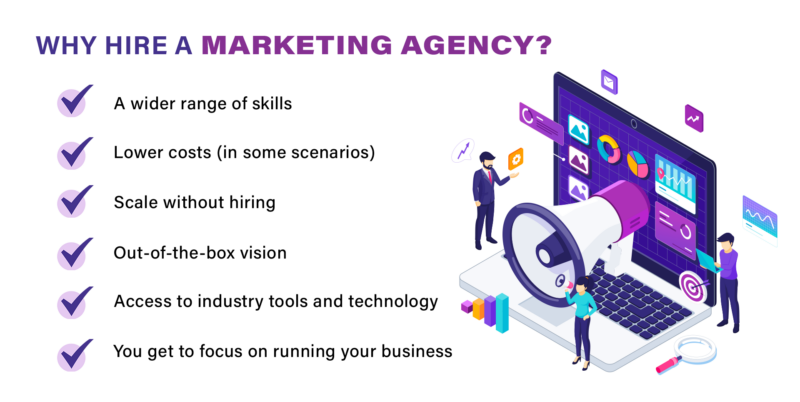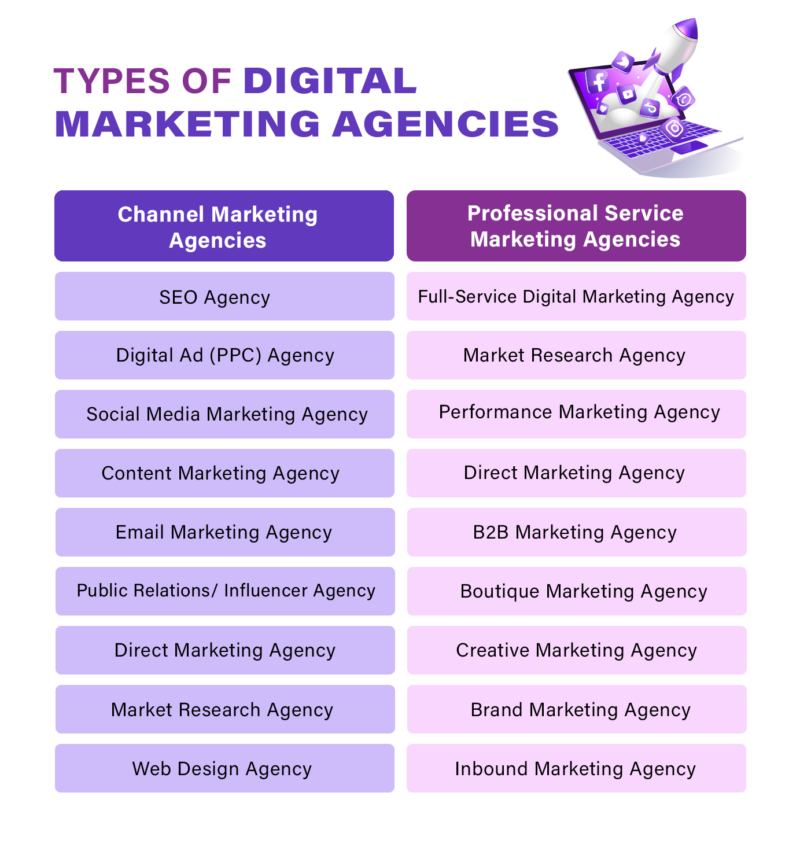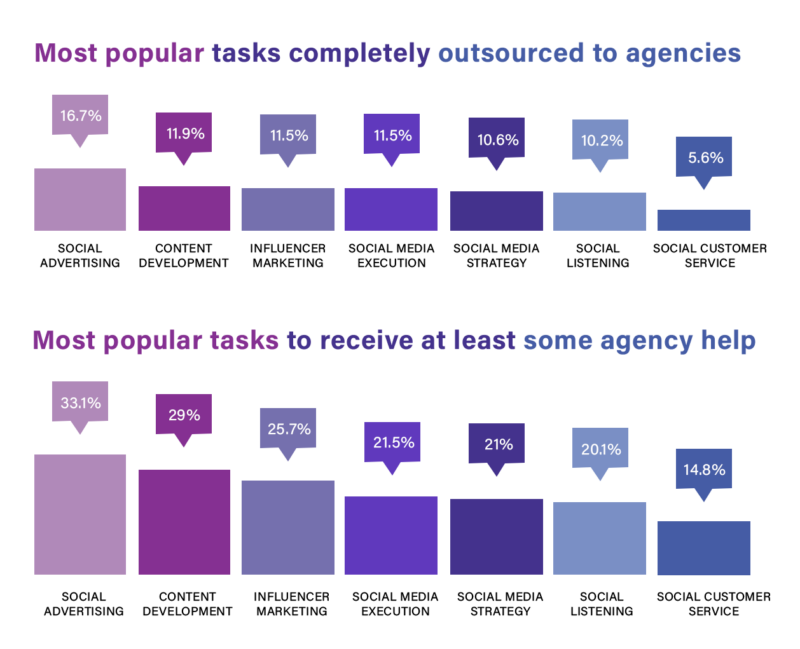The proliferation of digital platforms has catalyzed an impressive expansion in social media marketing. Today, enterprises, whether tiny start-ups or large corporations are emphasizing their visibility on prominent outlets such as Facebook, Instagram, LinkedIn, and Twitter. As the clamor for more tailored marketing approaches grows, there’s mounting pressure on social media marketing agencies to produce top-notch outcomes swiftly.
A strategy these agencies are adopting to navigate this burgeoning demand is through outsourcing. This approach serves not just as a mechanism to manage the mounting tasks but also presents a spectrum of advantages.
The Benefits of Outsourcing for Social Media Marketing Agencies

Cost-effectiveness
Outsourcing, especially in the context of outsourcing social media marketing, can substantially cut down on overhead and labor expenses. Rather than recruiting full-time employees, a social media marketing agency can opt to contract out specific components of their social media marketing strategy. This allows them to pay exclusively for the particular tasks linked to managing and promoting social media accounts. Agencies can achieve more financial flexibility and efficiency by choosing to outsource social media marketing tasks.
Flexibility
Outsourcing, mainly social media outsourcing, provides a dynamic flexibility that traditional in-house teams might lack. It allows agencies to quickly adapt their social media efforts, scaling them up or down based on the ever-evolving demands of clients. Given the unpredictable nature of social media platforms, this kind of adaptability is crucial. Rather than being constrained by a fixed number of staff, agencies can adjust their resources to maintain an optimal social media presence. This not only ensures consistency in social media management but also responds efficiently to the changing landscapes of digital platforms.
Access to specialized talent and tools
Across the world, there are dedicated professionals and established firms that have carved out a niche for themselves in the realm of social media marketing. These experts bring with them a wealth of experience tailored to specific social media campaigns and understanding of various social media platform. For a social media agency looking to elevate its offerings, outsourcing becomes an invaluable strategy. It empowers these agencies to delve deep into this vast pool of talent, ensuring that their digital marketing initiatives and every individual social media campaign harness the expertise of these specialists, thereby optimizing results and outreach.
Time-saving
By choosing to offload certain responsibilities, especially through outsourcing social media management, agencies, particularly those specialized as a social media marketing company, can realign and concentrate their efforts on their foundational business operations. This strategic delegation not only streamlines processes but also allows social media marketers within the agency to leverage their expertise more effectively. By using their in-house resources in tandem with advanced social media marketing tools, they can bolster both efficiency and productivity, ensuring that their strategies are both innovative and impactful.
Geographic reach
By collaborating with outsourcing partners situated in varied time zones, agencies have the unique advantage of ensuring continuous, round-the-clock work. This becomes a pivotal strategy, especially when you outsource social media management, given the nature of online platforms that are always active. With such a global approach, agencies can be better positioned to meet their social media marketing goals, maintaining a robust and consistent presence on platforms that truly never rest.
Common Tasks That Can Be Outsourced

Content Creation
This process encompasses not just the creation but also the design and fine-tuning of compelling graphics, the meticulous production of videos that tell a story, and the drafting of written materials. These elements, individually and collectively, are tailored to resonate deeply, ensuring they draw in and engage diverse audiences.
Social Media Strategy Planning
Dedicated teams work diligently on the creation of holistic, detailed, and forward-thinking strategies. These blueprints are meticulously adapted for an array of social media platforms and are strategically aimed towards capturing the interest of specific audience demographics, ensuring maximum engagement.
Account Management and Customer Service
Beyond just managing accounts, there’s an active, consistent, and empathetic engagement with the online community. By promptly responding to their varied inquiries, the goal is to establish trust, building a strong rapport while simultaneously upholding a uniform, recognizable, and consistent brand image across diverse platforms.
Analytics and Reporting
This is not just about numbers. It’s about collating vast amounts of data, diving deep into them with analytical precision, and presenting these insights in a coherent and insightful manner. By doing so, the aim is to clearly measure, understand, and then further refine the success and outreach strategies of various campaigns.
Paid Ad Campaign Management
From ideation to execution, the focus is on overseeing and executing paid promotional campaigns with precision. These efforts are especially intensified on major platforms like Facebook Ads and LinkedIn Advertising, ensuring that every penny spent translates into tangible results.
Influencer Outreach and Management
The digital landscape is vast, and within it, there are voices that resonate deeply with audiences. The goal here is to actively seek out these voices, initiate meaningful dialogue, and then foster long-term, mutually beneficial collaborative efforts with influencers. This ensures alignment with the brand’s values, objectives, and the desired message it wishes to convey to its audience.
Factors to Consider When Outsourcing
Quality Assurance
It’s of utmost importance to ascertain that the work sourced from external partners not only aligns with but ideally surpasses the agency’s established standards of quality and excellence. By setting forth clear, detailed guidelines and setting specific benchmarks or milestones, agencies can streamline this process, ensuring that each phase of the project aligns with their expectations. These guidelines and benchmarks serve as a roadmap, providing both clarity and direction, making certain that all stakeholders involved understand the desired outcome and the quality parameters within which they should operate.
Communication
Maintaining frequent and consistent touchpoints is of paramount importance for ensuring the smooth execution of projects. When agencies collaborate with partners across diverse geographical regions, several factors come into play that can impact the flow of communication. It becomes essential for agencies to be cognizant of and strategize around differences in time zones, which can affect the synchronicity of interactions.
Additionally, potential language barriers might necessitate clearer explanations or the use of interpreters to ensure that messages are conveyed accurately. Beyond language, understanding and respecting cultural nuances is also vital, as these can subtly influence interpretations and decision-making processes. By acknowledging and planning for these variables, agencies can foster stronger, more effective lines of communication with their outsourced partners.
Security and Confidentiality
The safeguarding of client data stands as an absolute imperative, with no room for compromise. In the complex landscape of digital collaborations, it’s essential that every measure is taken to ensure the utmost security and confidentiality of this data. To fortify this protection, Non-Disclosure Agreements (NDAs) should be meticulously drafted and signed, laying out in clear terms the boundaries and expectations regarding data access and sharing. Furthermore, rigorous data handling and processing agreements should be established, detailing the protocols for storage, transfer, and disposal of client information. These steps not only provide legal protection but also signify the agency’s commitment to upholding its clients’ trust and privacy.
Cost Vs. Value
Outsourcing, when executed strategically, can undoubtedly offer a cost-effective solution for many agencies. However, it’s imperative that agencies delve deeper into the financial landscape of such engagements. Beyond the evident expenses, there might be hidden or unforeseen costs that can emerge during the process. These could include training expenses, communication overheads, or potential costs related to quality assurance and revisions. As agencies navigate these financial intricacies, they should constantly weigh these expenditures against the anticipated Return on Investment (ROI). This holistic financial assessment ensures that the decision to outsource aligns not just with immediate budgetary constraints but also with the long-term fiscal health and profitability of the agency.
Expertise and Experience
It’s imperative for agencies to conduct thorough due diligence when seeking to partner with an outsourced entity for their social media needs. Before entering into any formal agreements, agencies should meticulously vet the potential partner’s past performance and accomplishments. This means going beyond surface-level evaluations and delving into their history, analyzing case studies, reviewing client testimonials, and even seeking references where possible.
The aim is to ascertain with confidence that the outsourced entity not only possesses the necessary expertise but also consistently demonstrates excellence and reliability in executing the specific social media tasks required. This in-depth vetting ensures that the chosen partner aligns with the agency’s standards and objectives, reducing the risk of potential pitfalls down the road.
Flexibility and Scalability
When partnering with an outsourced entity, it’s crucial for agencies to ensure that this collaborator possesses a high degree of adaptability and flexibility. The dynamic nature of client projects, especially in the fast-paced world of digital marketing, means that requirements can evolve or shift based on various factors, such as market trends, consumer feedback, or changes in the client’s business strategy.
As such, the outsourced partner should not only have the capability but also the readiness to recalibrate their approach, strategies, and deliverables in response to these evolving needs. Their ability to seamlessly pivot and adjust in line with these changes ensures the continued alignment of the project’s goals and outcomes, guaranteeing client satisfaction and fostering a robust, long-term partnership..
Feedback and Review Mechanisms
Establishing constructive feedback loops and consistently scheduling review sessions are pivotal steps in maintaining the integrity of any project. These processes allow both the agency and the outsourced partner to stay aligned in their objectives and output. Through regular and open communication channels, where constructive feedback is shared and discussed, potential misalignments or deviations can be identified early on. This proactive approach not only safeguards the quality of the work but also ensures its continued relevance to the project’s goals.
By dedicating time to these feedback sessions, agencies can foster a collaborative environment where insights are exchanged, fostering continual improvement and adaptation in response to evolving needs and standards. This, in turn, solidifies the relationship between the agency and its outsourced partner, ensuring a harmonious and productive partnership.
Best Practices for Successful Outsourcing
- Starting with a pilot project can give a taste of the outsourcing partner’s capabilities.
- Clear briefs and guidelines can mitigate misunderstandings.
- Regular status updates ensure that projects stay on track.
- Utilizing tools like Slack or Trello can enhance coordination.
- Open feedback channels can drive quality improvement.
Risks and Challenges
Potential over-dependence on external partners
Reliance on third-party entities might diminish an agency’s self-sufficiency, potentially leading to challenges if the partnership is disrupted.
Risks of quality inconsistencies
Engaging in collaborations with external teams or partners brings with it inherent challenges and uncertainties. One of the most notable concerns is the potential inconsistency in the quality of deliverables. Different teams might operate based on diverse standards or interpretations, and this can manifest as varied quality levels in their work. Such inconsistencies, if not addressed proactively, can culminate in final outputs that fall short of the rigorous standards and expectations set by the agency. It underscores the importance of establishing clear guidelines, benchmarks, and continuous communication when working with outsourced entities to maintain the desired quality throughout the project’s lifecycle.
Potential loss of the brand’s distinct voice
Outsourced partners might not always capture the unique tone and messaging of a brand, diluting its identity in the market.
Initial time investment required for training
Onboarding outsourced teams often necessitates a significant upfront time commitment to familiarize them with agency processes and standards.
Need to align the outsourced team with the agency’s overarching vision
Ensuring that external partners understand and resonate with the agency’s long-term goals is crucial for cohesive and productive collaboration.
Outsourcing, when approached with a well-thought-out strategy, can be a game-changer for social media marketing agencies. The key lies in identifying the right tasks to outsource, partnering with the right entities, and consistently monitoring and refining the process.

Social media marketing agencies are in a dynamic, ever-evolving landscape. In this challenging environment, it’s prudent to assess operational strategies. By considering outsourcing, agencies can find new avenues to drive growth, efficiency, and excellence. It’s time to embrace the future.



Leave A Comment
You must be logged in to post a comment.